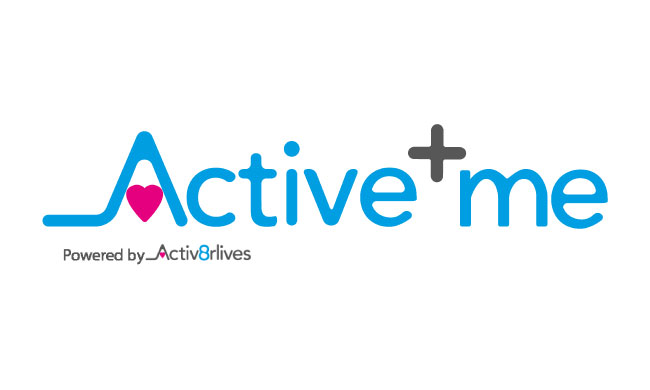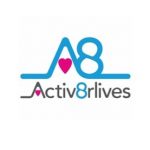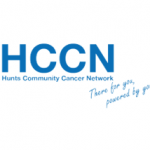

Aseptika Ltd, Huntingdon announces the Active⁺meᵀᴹ community-based, life-long rehabilitation and support programme, will be showcased in preparation for wide-spread adoption, at the Eastern AHSN Embracing Self-care event in Newmarket today.
Active⁺me is a new model for low-cost, community-based and life-long rehabilitation programmes for people diagnosed with long-term conditions such as Cancer, Cardiovascular and Respiratory disease. It uses exercise classes delivered by qualified but non-medical staff, supported with self-care technology, education and training, in a peer-to-peer supported programme developed in Huntingdonshire.
In May 2017, the Active⁺me feasibility programme began with cardiac rehabilitation classes integrating Aseptika’s Activ8rlives self-monitoring technology. These classes have now been extended to include people with cancer in partnership with a local cancer charity who has pioneered a new exercise programme for patients before during and immediately after their treatment.
Active⁺me is the result of a collaboration between Huntingdonshire District Council (HDC) Active Lifestyles, Huntingdonshire Community Cancer Network (HCCN) and enabled with Aseptika’s innovative Activ8rlives health platform and supported by Eastern Academic Health Science Network (Eastern AHSN). This cross-organisational collaboration has been key to its success and deployment – a model Eastern AHSN is hoping to replicate across the Eastern region to reduce the workload of over-stretched NHS Hospitals.
Improving outcomes for older adults who have experienced a cardiac event (e.g. heart attack or corrective surgery), are living with or beyond cancer or have respiratory disease, reduces their need to access acute care or supported services.
Exercise and education can improve or maintain health for all forms of long-term condition (1). For those diagnosed, once acute treatment by the NHS has ceased, participants have limited support until they become acutely unwell or frail and then the costs escalate for the health and care system, already under considerable strain every winter.
Traditional rehabilitation classes are sometimes described as Level 3 or Phase 3, and follow a NICE-approved syllabus delivered in a hospital setting, over an eight-week period, usually with two classes each week. These are staffed by clinically-trained personnel with very close observation of the patients during exercise. But following discharge from Level 3 rehabilitation, there is often no follow-up processes other than outpatient appointments, in a system already prone to overbooking and long waiting times for newly referred patients.
Active⁺me fills the gap between existing health and care services, to improve health outcomes and minimise expensive interventions resulting from deterioration and unlike traditional 8-week rehabilitation classes, Active⁺me is for the rest of the person’s life, made possible through automation by using a digitally-delivered solution.
People who are “activated” (a medical term indicating their increased level of knowledge and higher capability to care for themselves) are more likely to adopt positive behaviours and have clinical indicators within a normal range, resulting in 8% lower costs than those less activated in the first year of support and 21% less in the second year (2).
Active⁺me provides:
• Safe, supervised and evidence-based group exercise classes, delivered in the community by Physical Activity Specialists (PAS);
• Education in the use of digital health technologies empowering participants to self-care, delivered alongside;
• Peer support group(s) during which there are review sessions by PAS staff using participant-recorded data;
• Evidencing physiologically-based benefits to both participants and stakeholders; and
• Increased skills, knowledge and confidence of participants to better manage their own condition, measured through Patient Activation Measure (PAM).
Ends
For further details and images please contact Jessica Auton on 01480 352 821 or email jessica.auton@aseptika.com
Maggie’s story To watch a movie with Maggie’s story follow this link.
Colin’s story To watch a movie with Colin’s story follow this link.
Background
Approximately 15 million people in England have a long-term condition and the number of people with multiple long-term conditions is rising (3).
Many people don’t feel confident enough to manage their own health, leaving patients far more exposed to a deterioration in their condition.
Studies show that targeted interventions for people with long term conditions can increase an individual’s activation and their capacity to self-manage their condition more effectively (2).
Patient activation describes the knowledge, skills and confidence a person has in managing their own health and care (3). The concept of patient activation links to the principles of person-centred care, and enables the delivery of personalised care that supports people to recognise and develop their own strengths and abilities.
People with lower levels of activation are likely to need more in-depth one to one support as compared to people with higher levels of activation. When appropriately supported, evidence shows that people with lowest levels of activation make the most gains.
A range of interventions tailored to individuals’ needs are required to support people to increase their knowledge, skills and confidence. However, people have a key role to play in protecting their own health, choosing appropriate treatments and managing their conditions.
Self-care is a term used to include all the actions taken by people to recognise, treat and manage their own health.
The Active⁺me model which has been rolled out in Huntingdonshire across two disease areas (cardiac and cancer) has given us a tried and tested approach for person-centred supported self-care which can be replicated across the country.
References:
McMillan Exercise Evidence Review: https://www.macmillan.org.uk/documents/aboutus/commissioners/physicalactivityevidencereview.pdf
Sacha J, Sacha M, Soboń J, Borysiuk Z, Feusette P. Is It Time to Begin a Public Campaign Concerning Frailty and Pre-frailty? A Review Article. Frontiers in Physiology. 2017;8:484. doi:10.3389/fphys.2017.00484.
Hibbard, J and Gilburt, H. (2014) Supporting people to manage their health. The Kings Fund. https://www.kingsfund.org.uk/sites/default/files/field/field_publication_file/supporting-people-manage-health-patient-activation-may14.pdf


About Aseptika Limited (Activ8rlives) www.activ8rlives.com
Aseptika Ltd began developing Activ8rlives in 2010 and is currently developing its third generation of integrated systems, which can be used by consumers and their healthcare service providers using a wide range of platforms or devices to better enable effective and easy self-monitoring. Incorporating sensors and monitors ranging from consumer accessories to in vitro diagnostics (IVDs), the systems currently focus on respiratory and cardiovascular disease, cancer, promoting physical activity, and weight management.


About Eastern Academic Health Science Network www.eahsn.org
Eastern Academic Health Science Network (Eastern AHSN) operates as part of the national network of 15 AHSNs, established by NHS England, covering the counties of Bedfordshire, Hertfordshire, Cambridgeshire, Essex, Norfolk and Suffolk.
Our objective is to support the adoption of proven innovations that will benefit the health and wealth of people and businesses across the East of England.
Our support package includes innovation identification, providing implementation expertise, networking, modelling and guidance on accessing alternative funding streams.
Our strong network of connections access to funding and ideas, and proven history of results, means that the projects we work on have a high certainty of success.


About Hunts Community Cancer Network www.hccn.org.uk
Hunts Community Cancer Network (HCCN) comprised of the Hunts Community Cancer nursing team, the HCCN Charity and volunteers.
Working together and delivering a home-based nursing service, our aim is to help people who are recovering from or living with cancer in the Hunts area to take back their lives and to play an active part in managing their health. The team is based at the Woodlands Cancer Unit at Hinchingbrooke Hospital.
The ‘Get Active’ scheme and BuddyBand2’s are rolling out across the Huntingdonshire area and will need continued funds from fundraising activities to ensure the charity can support everyone who wants access to it.


About Huntingdonshire District Council http://www.huntingdonshire.gov.uk/leisure/one-leisure-active-lifestyles-team/
The One Leisure Active Lifestyles team (OLAL) is part of the Leisure & Health Division within Huntingdonshire District Council. The One Leisure Active Lifestyles team offers a wide range of sport and health related activities to promote a healthy population within the district.
The team works closely with a number of partners to improve the health of the community, promote active healthy lifestyles and decrease sedentary-related illnesses for older people with activities, such as Exercise Referral Scheme, RightStart, Specialist Classes and health walks.
